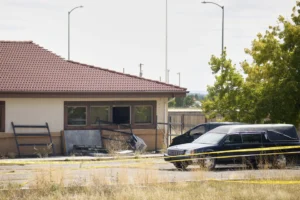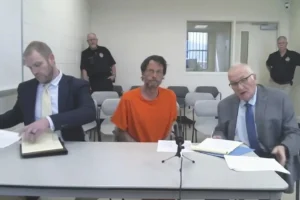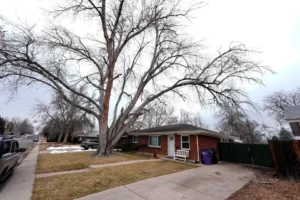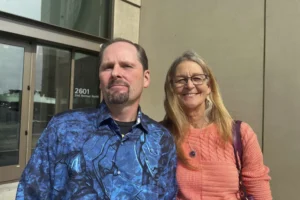A Jackson Resident Seeks Solace from His Addiction
The long journey from a small town in Mexico leads to Jackson Hole
- Published In: Criminal Justice
- Last Updated: Sep 19, 2023

Tattoos on Armando’s arms hint at the story of his life. (Wyoming Truth photo by Alec Klein)
By Alec Klein
Special to the Wyoming Truth
Editor’s Note: This story is part of an ongoing series about the impact of the lack of inpatient rehabilitation treatment centers in Jackson Hole. It discusses drug addiction, alcoholism, domestic violence and sexual abuse. Reader discretion is advised.
JACKSON, Wyo.—You wonder where it all started, how it got to this soul-crushing point: Dead broke, living on the streets in filth, while your only companion is hopelessness, and all that you wait for, in the hazy mist of a life not lived, is the next hit of meth.
Armando knew. He was about 28 years old. He slept in a dingy alley in Las Vegas, not far from the bright lights of the casino strip, a shimmering illusion in the desert. He’d head to the Salvation Army for clothes and a shower. He’d wander over to the nearby Home Depot, offering himself up as a laborer for the day. Moving, roofing, construction. Whatever came his way. Didn’t matter. Just as long as he made enough to buy a rock of methamphetamine — a seductive stimulant —for about $5 a pop, to feed his voracious addiction.
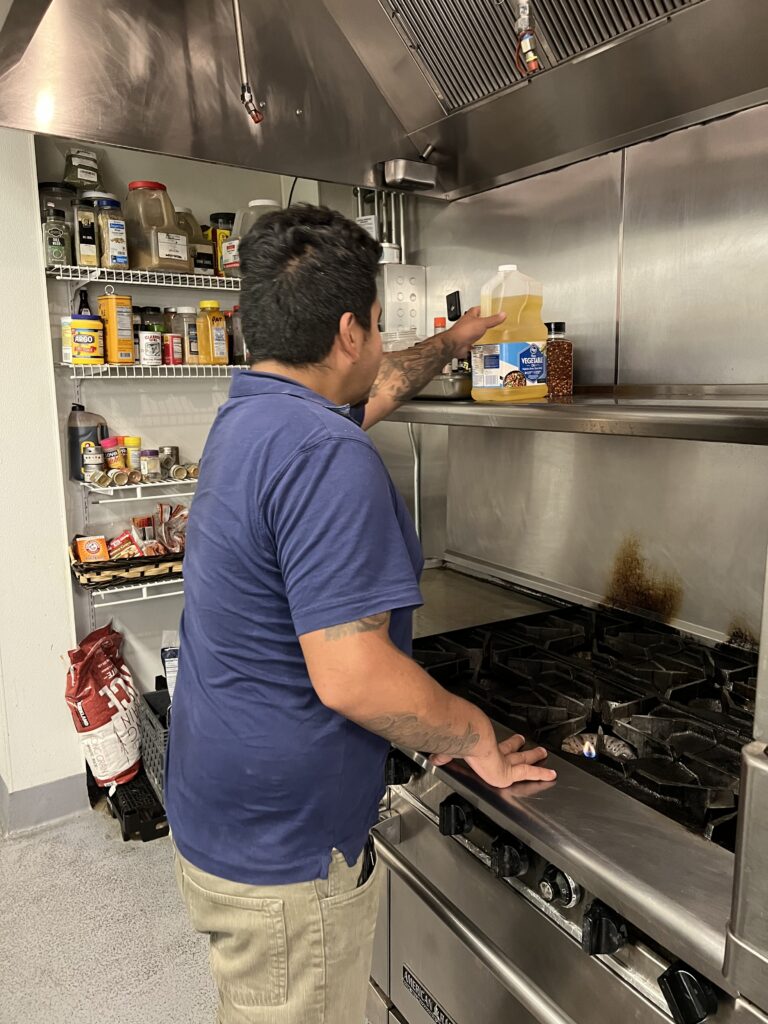
It was there, in that Vegas alley, when he caught sight of a group of about 10 people approaching him one day, and his first thought was: Uh oh. Trouble.
Freeze frame.
This was a few years before Armando arrived in Jackson Hole. Before he arrived on the banks of a rambling river. Before he knew what he was getting himself into. Jackson, known for its glorious mountain peaks and fabulous wealth, caters to tourists galore, but as for people suffering from addictions? Not so much. Jackson Hole offers short-term detoxification and outpatient services. But there isn’t, for instance, inpatient rehabilitation services here, despite the region’s high rates of alcohol and substance abuse.
Armando, who could have benefited from such long-term treatment, spoke to the Wyoming Truth on the condition that his identify not be revealed, given his struggles with drugs and alcohol and his status as an undocumented worker who came to the United States from Mexico without immigration papers.
At his lowest point, Armando said, “I thought I was going to die. There was no future for me.”
The Vegas darkness
But let’s scroll back a few years. Armando was 24 when he took a bus from northern California to Las Vegas. All that he was carrying — the contents of his entire existence — was comprised of a small backpack and the youthful excitement of moving to a new place plentiful with jobs.
“I didn’t know Vegas was very dark,” he said.
In short order, he secured a room and a gig as a breakfast cook. Before long, he had moved up to a position as a chef, second in charge. He moved into a place of his own, a studio apartment. He worked out at the gym. He drove to work, without a license, a residue of his immigration status. It was, he thought, almost a normal life.
And then he met Yabeth. There was a common bond: They worked at the same restaurant, where she did food prep and dishwashing. She, too, came from Mexico, in Juarez, near the El Paso border. She was outgoing in contrast to his reticence, but even that fit, her ying to his yang, so much so that they began seeing each other.
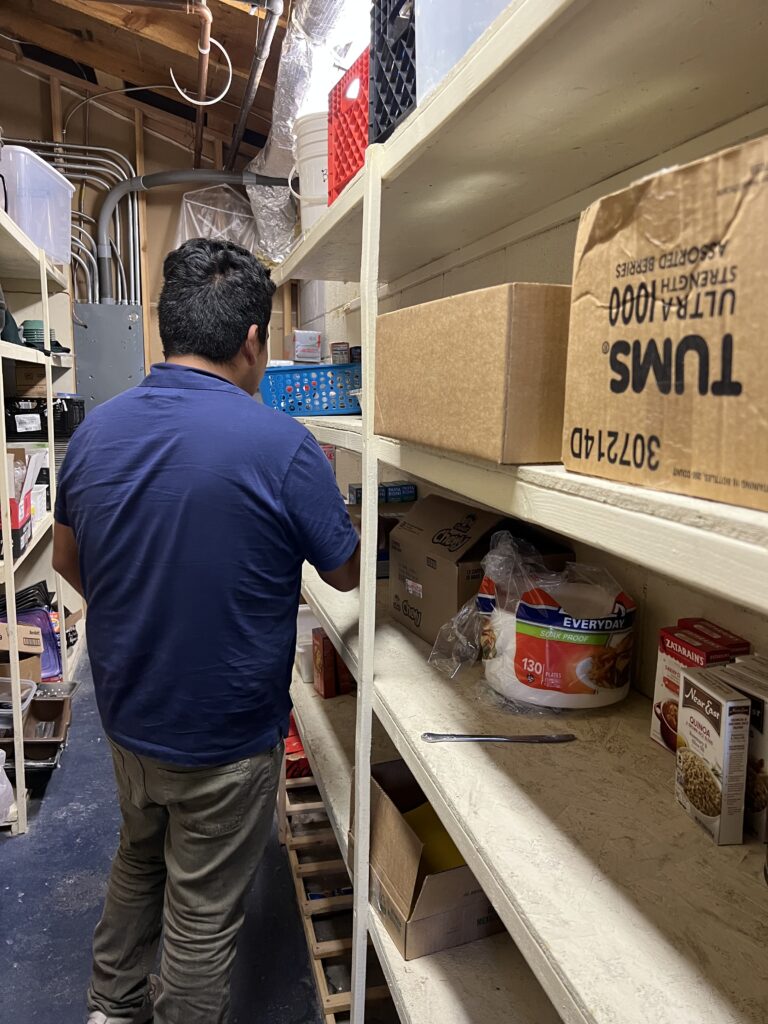
It was the first time in Armando’s life that he had dated anyone. He was 27. “I was really in love so much,” Armando said. “I opened a book, I opened my heart. She was my everything.”
Until she wasn’t.
Two things happened, one right after the other, like a one-two punch: Armando learned that his father had been killed at home in Mexico. The circumstances were unclear, other than that his father had been beaten with a bat to his head. The killers were believed to be two teenagers and another young man. His mother wasn’t home at the time.
Grief-stricken, Armando withdrew from everyone, seeking to protect himself in the cocoon of his solitude, even pushing away his beloved Yabeth. But within days, he found out that she had wandered off with another guy who worked at the same restaurant.
First, he lost his father. Now Yabeth. “It was hard,” he said quietly. Armando started drinking. And before long, he resorted to the hard stuff: meth.
It wasn’t his first time. But it had been a long time since he had been acquainted with the powerful drug. “It made me feel stronger” is his explanation for the relapse.
It’s hard to fathom how the fall came so fast. But everything can change in an instant. And it doesn’t take much—just a small rock of meth. Armando faltered. He lost his job. Then his apartment. After which came the denouement, when he found himself squatting in the squalor of the streets of Las Vegas.
But was it just the loss of his first love — or even the death of his father — that led him to the collision with his addiction? After all, he had fallen hard before. It happens. There is no escaping it. Armando knows all too well.
Coyotes at nightfall
We have to go back further in time, back when Armando was 13 years old. Nightfall had arrived, and after being transported in a minivan, he walked for two days and two nights, making his way from his dusty little town in the western Mexican state of Jalisco, south of Guadalajara.
Two coyotes — men hired to smuggle people across the border — guided Armando, two of his sisters and a handful of others—but not his parents, who had made the passage earlier. It was slow going and treacherous, as one coyote led the way to Tijuana, while the other used a tree branch to sweep away the footprints they had just left in their wake—erasing the evidence of the exodus.
On the last leg of the journey, he sat on his knees, crying in the back of a truck on its way to northern California. Sitting in this position for hours was painful but he was told not to move.
Armando was weary but not afraid. The opposite: In his mind’s eye, America signified a better life. Of big buildings! Of great riches! You don’t even have to pay rent! “Not living the life miserably, the way we were in Mexico,” he said.
The reality, as it unfolded, was different.
By the time Armando was 15, he was living with his family who had also made it across the border, and he was working as a dishwasher in a Chinese restaurant in northern California. His mother worked as a dishwater, too, while his father got a job in food prep.
But Armando barely spoke English, and he was attending a high school that was riddled with danger—rival gangs. The only way to survive, he reckoned, was to associate with one gang or the other — one from the north, the other from the south — for protection. And if someone told you to do something, you did it, and that included when someone offered him a beer. So, he drank. Or when he was offered cocaine. Which he took, no questions asked. But when he tried meth for the first time? Well, that changed everything.
“It makes you feel like you’re flying” he recalled. “You don’t feel tired. You don’t feel pain. Nothing is going to touch you.”

That, he said, is when the addiction first took hold. By the age of 17, he dropped out of high school. A friend from Mexico got him a job working in a restaurant, where he learned to cook. It was a start. Things, he thought, were getting better, even though his parents ended up giving up on the American dream, returning to their small town in Mexico some years later. As for Armando, his addiction subsided—dormant, that is, until his fall in Las Vegas. But could the explanation for his addiction be traced back to high school? Was it as simple as that? Just because he was offered drugs and alcohol and he felt compelled to partake? Or was the addiction rooted in something deeper?
Coke and a piece of bread
We have to fold back other layers, back when Armando was 11 years old, living dirt poor in a small village — population, about 2,500 — in southern Mexico. That’s when his younger brother, Edgar, drowned in a river.
He was 7 years old.
Edgar’s death was unfathomable. He and Armando had been so dearly close. They even shared clothes. But it was more than that. Armando was the first boy in the family. He was named after his father, a hard man who worked in the fields, cutting down potatoes and tomatoes.
Armando found it untenable to live up to his own name—his father’s name and great expectations, especially after Edgar’s death. When Armando reflected on himself, he thought he was too shy. He thought he was too heavy. And his father let him know it.
“Your little brother is better than you!” his father would scream. “You don’t deserve my name!”
Armando didn’t know then that his father was already addicted to drugs and alcohol. But would that have eased the pain from those harsh words seared into the brain? What could a little boy understand when his father is yelling and slapping and kicking him? When there is no reason?
Armando sought refuge with his mother, who sold sugar candies from door-to-door. But when she wasn’t defending her son, she, too, was sometimes unyielding, if not cruel. In a fit of rage, she would wrap a cord around Armando’s neck, threatening to end him. But Armando said flatly of his parents, “When you grow up, you know they will never kill you.”
As if that explains it.
There were other problems, like hunger. His family was so poor, there often wasn’t enough food for all six children. “You didn’t eat three times a day,” he said. Sometimes, all they ate were beans or a tortilla with salt.
They lived in a tiny, one-room house, where they slept on mattresses on the floor. As a boy, Armando worked in the fields, too, making mere pesos—the equivalent of about $25 a week, the sum total for working eight hours a day, five days a week, under the baking sun.
“My dream was to have Coke and a piece of bread—sweat bread,” he said. “That’s the first thing you do when you have money.”
That dream changed when Armando turned about 12 and met a man named Juan who was considered wealthy in town; Juan owned trucks and property. He also owned an addiction.
As Armando learned along the way, Juan trafficked in drugs, including marijuana and white powder.
Juan took the young Armando under his wing, treating him like something of a son. At least, that’s how Armando saw it. He learned to milk cows on the ranch and feed the animals. Juan taught the boy to fire a gun. He also introduced him to marijuana. And he took Armando to see a prostitute.
“It wasn’t what I was expecting,” he said.
As he looked at the prostitute, a woman with big curly hair and a wide face, Armano thought she looked as old as his mother.
He cried.
The dream
Back to Las Vegas. When those 10 people approached a homeless Armando in that alley, they weren’t after his money, not that he had any. They were more interested in saving his soul.
“Do you want to change your life?” asked one from the group.
Until then, he said, “God wasn’t in my heart.”
It turned out the group came from a church. They ran a program for those suffering from addiction—akin to inpatient rehab. They gave Armando a place to live next to the church. They showed him love and friendship. He learned about Jesus. He began cooking again—for the church. He stayed for a year and kicked his habit—or did he?
When he finished the church program, a friend suggested he move to Jackson Hole. There were jobs to be had. Ranches, too. Armando knew something about ranches, from his childhood in Mexico, and he thought, much as he had about the move to Las Vegas: Why not?
He arrived in Jackson by bus about a year ago and found a job as a cook, making meals like pasta and meatloaf. A few months ago, he was fired after he was caught drinking on the premises. But his employer gave him a second chance.
Armando seems to consider it a minor slipup. It was, he said, just a “single beer.” But isn’t that one of the dangers of addiction—letting your guard down? In the absence of inpatient rehab services in Jackson, Armando fights the fight of addiction alone. The kitchen is his refuge, and the story of Armando’s struggle is etched on his body. On one shoulder is a tattoo of Jesus. One forearm displays the name of his mother. The other, of his father who, in the latter years of his life, asked for his son’s forgiveness. Armando gave it. One forearm shows a menacing-like devil figure; the other, an angel. They represent, Armando said, the two warring sides of him.
Meanwhile, his dreams have moved on. Now, at the age of 31, he imagines a bigger future. It’s not merely a Coke and sweat bread. It’s not the mirage of a country of plenty, where rent is free. No. He simply wants to start his own business.
A taco truck.


